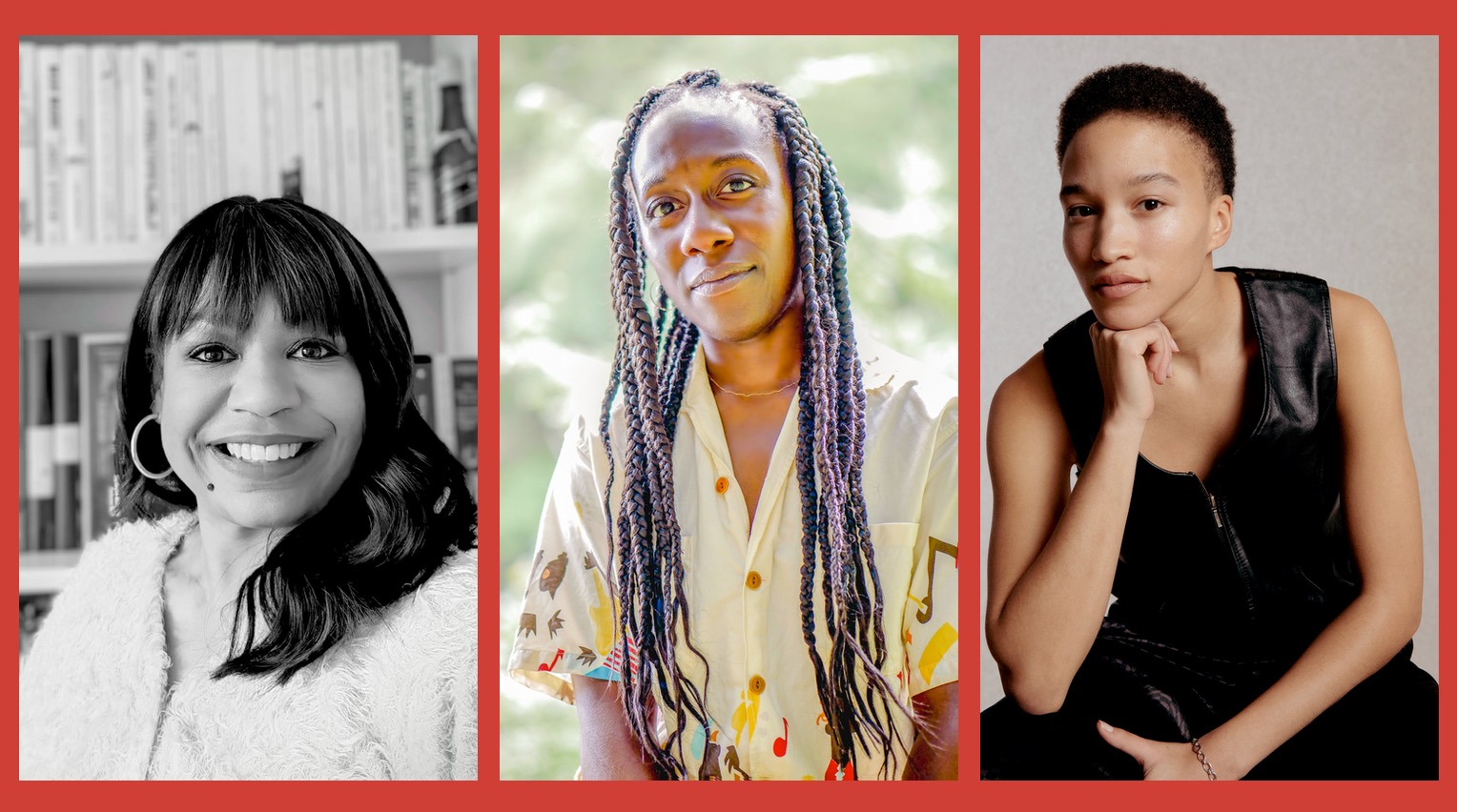Eisa Davis’s ‘The Essentialisn’t’ wins the narrative by losing it
By Asia Stewart
When I walked into HERE Arts Center, I was immediately initiated into a sacred space. In the corner of the theater, writer-performer Eisa Davis had precariously positioned her body above a six-foot tank full of water. Wearing a white dress, she gripped the tank’s edges as she lowered her legs and torso into the container and wound a black rope around her feet. It was not yet time to complete the baptism; Davis refused to let her head dip below the water line.
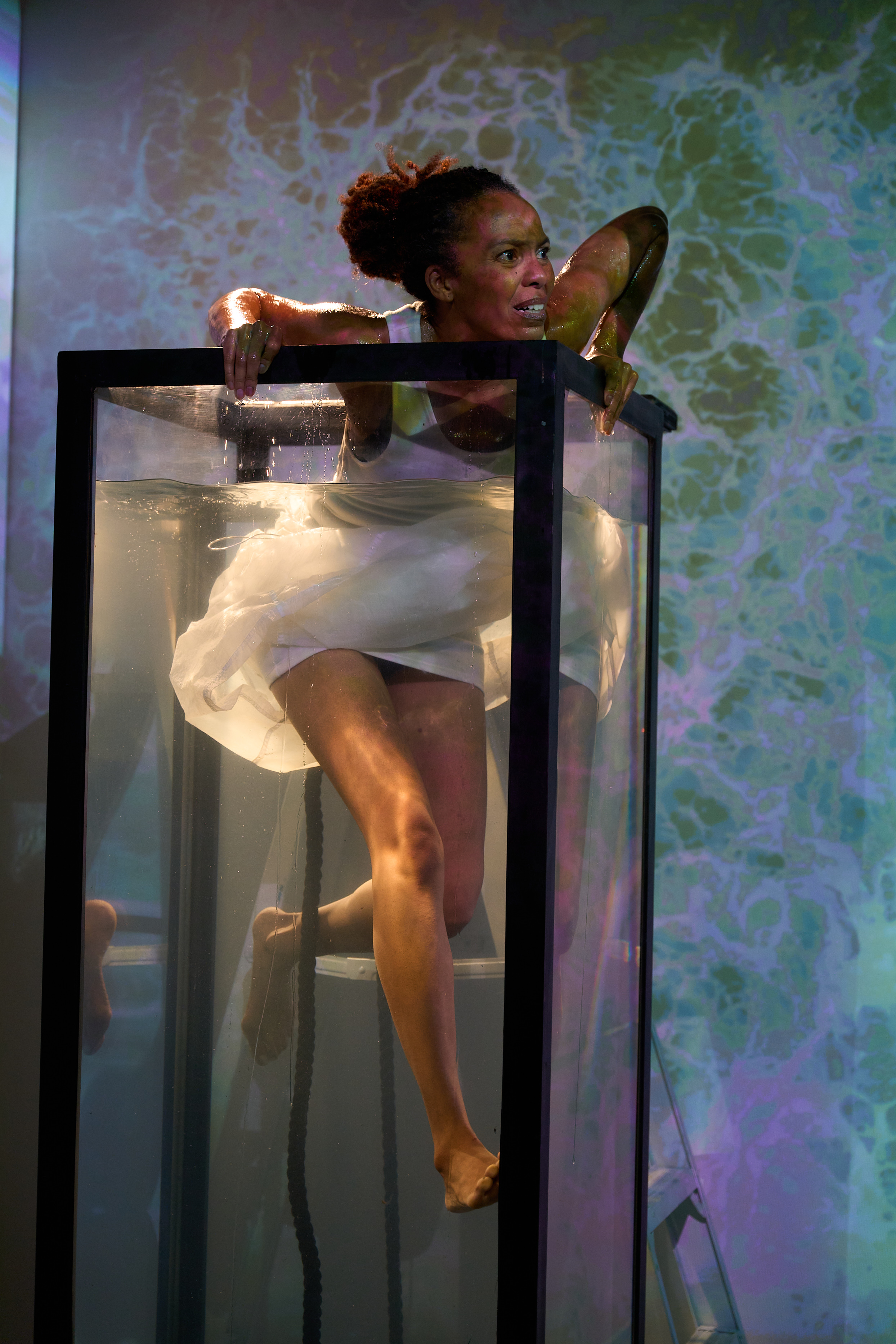
The tank operated as both an embryonic, womb-like vessel and a funereal embodiment of the Middle Passage, carrying histories of terror and loss. This astonishing tableau and moment of ancestral communion served as the introduction to The Essentialisn’t, a sprawling performance on the expansiveness of Black femininity that Davis also directed. Defying categorization, this 90-minute production is a non-narrative, experimental song cycle that features Davis’s original music. As Davis declared from the keyboard throughout the night, the work is decidedly invested in everything that remains after narrative is stripped from Blackness: music and the “instinctual…ecstatic, mystic, ceremonial” rituals that can “make sense out of no sense”.
After emerging from the tank, Davis activated the Sovereigns (played by Jamella Cross and Princess Jacob), whose presence had been concealed by piles of hair scattered on the floor. The two retrieved a dress made out of hair for Davis to don. While dressed in this absurd garment, Davis posed a near-rhetorical question: “Can you be Black and not perform?” After several seconds of silence, Davis sang “No,” and the room immediately erupted into laughter. Right on cue, Cross and Jacob wheeled out a clothing rack that held a sign with the same words emblazoned in fuschia neon. The evening’s real question became clear: If we know that, under forces of white supremacy, performance has been compulsory for Black people since enslavement, what does non-performance look like?
The Essentialisn’t rejects the insistence that Black people, namely Black women, must always deliver entertainment, comedy, pleasure, or catharsis to a waiting audience. The Sovereigns, for instance, named to “have total sovereignty over their body, over the stage” moved about the theater in a state of total ease. Sporting comfortable sweatsuits, Cross and Jacob frequently drank tea, sprayed rose water onto their skin, and relaxed on the floor. They highlighted the production’s foremost aim to relieve its cast members of the flattening, immutable expectation that they must always be of service to the audience and are only valuable insofar as they are performing.
The production often disarmed audiences by using silliness as a conduit to horror. A song that included the lyrics, “I’ve got a bullet on my heart” ended as an ode to a crispy chicken wrap recipe. Later, the limitations of essentialism were relayed through the sing-songy earworm, “if I am an object / if I am a category / am I violated before the violence comes?” Some audience members hummed along or chuckled until the tune’s seriousness sank in. Towards the end of the production, Davis, Cross, and Jacob entered a sudden game of tug of war with a thick synthetic braid. They all lost the game by dropping the braid onto the floor. Their spoiled play preceded a dirge for Sandra Bland, a young Black woman who died in police custody after being forcibly arrested for a minor traffic violation in 2015. Catapulting between emotional extremes, the performance was disorienting at times. However, the abrupt transitions forced audiences to question what their hasty laughter was masking.
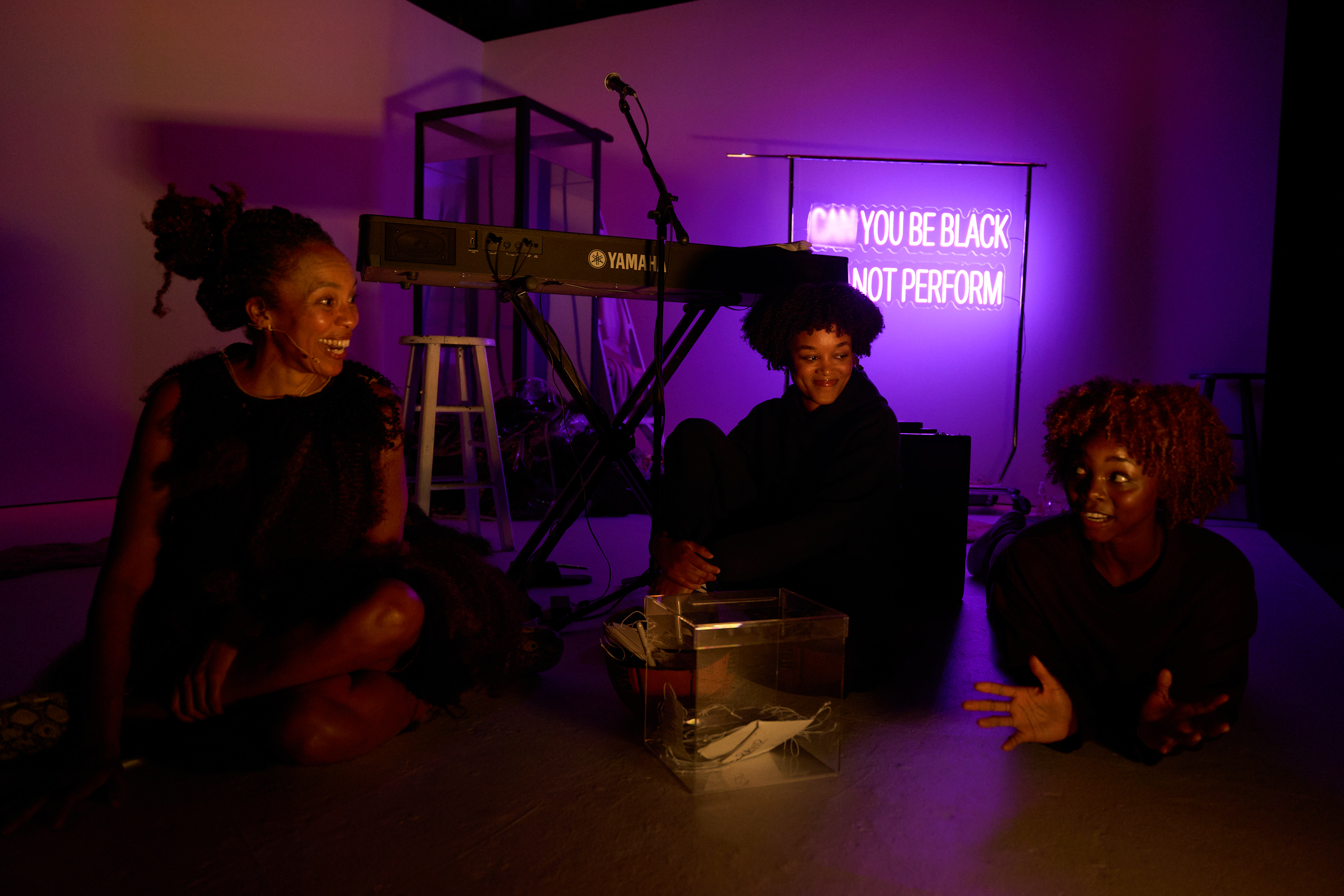
Throughout the night, Davis, Cross, and Jacob used pieces of white paper to reconstitute the neon sign. The light’s transformation was poetic:
CAN YOU BE BLACK AND NOT PERFORM
YOU BE BLACK AND NOT PERFORM
YOU BE BLACK NOT PERFORM
YOU BE BLACK PERFORM
YOU BLACK PERFORM
BLACK PERFORM
BLACK FORM
The changing text, shifted from the interrogative to the imperative to the expressive, operated as a marker of transitions between songs, chants, actions, and exercises. During one interlude, Cross and Jacob became Davis’s graduate school acting teachers. (Davis attended The Actors Studio at the New School.) They requested that Davis perform as Maggie from Tennessee Williams’ play Cat on a Hot Tin Roof, which follows the unmooring of a white Southern family on a Mississippi plantation. The order, of course, was impossible. Davis could not abandon race and gender and naturally slip into a character whose central motivation was to use her sexuality to deceive everyone around her. The Sovereigns (as acting coaches) encouraged Davis to simply be “Black Maggie”. However, “Black Maggie” was contrived and exaggerated, false to both performer and character. Though Davis “failed” to become Maggie the Cat, she created something entirely new when she reconstructed Maggie’s monologue:
You weak beautiful people who give up with such grace. What you need is someone to take hold of you––gently, with love, and hand your life back to you…I’m determined to do it because life has got to be allowed to continue even after the dream of life is all over. Alive. Maggie the cat is alive. I’m alive. Alive! I’m alive! Because we may have lost the war, but I’m determined to win the narrative.
The final sentence, absent from Williams’ play, makes it unclear whether Davis was performing as Maggie or herself. Was she voicing antebellum nostalgia as Maggie or insisting on Black survival and reclamation of the historical narrative as herself?
The Essentialisn’t culminated with Davis’s second, full submersion in the water tank: a momentous act that arguably could have concluded the show. The Sovereigns’s declaration, “This is not a performance. This is a Black woman” released Davis from the pressure of performing or conforming to a fixed identity. Instead, she embraced the water’s inconstant and unpredictable nature. Davis became, as artist Debra Cartwright commented on opening night, a Calida Rawles painting come to life. Her body, refracted by ripples of water, radiated something undefined.
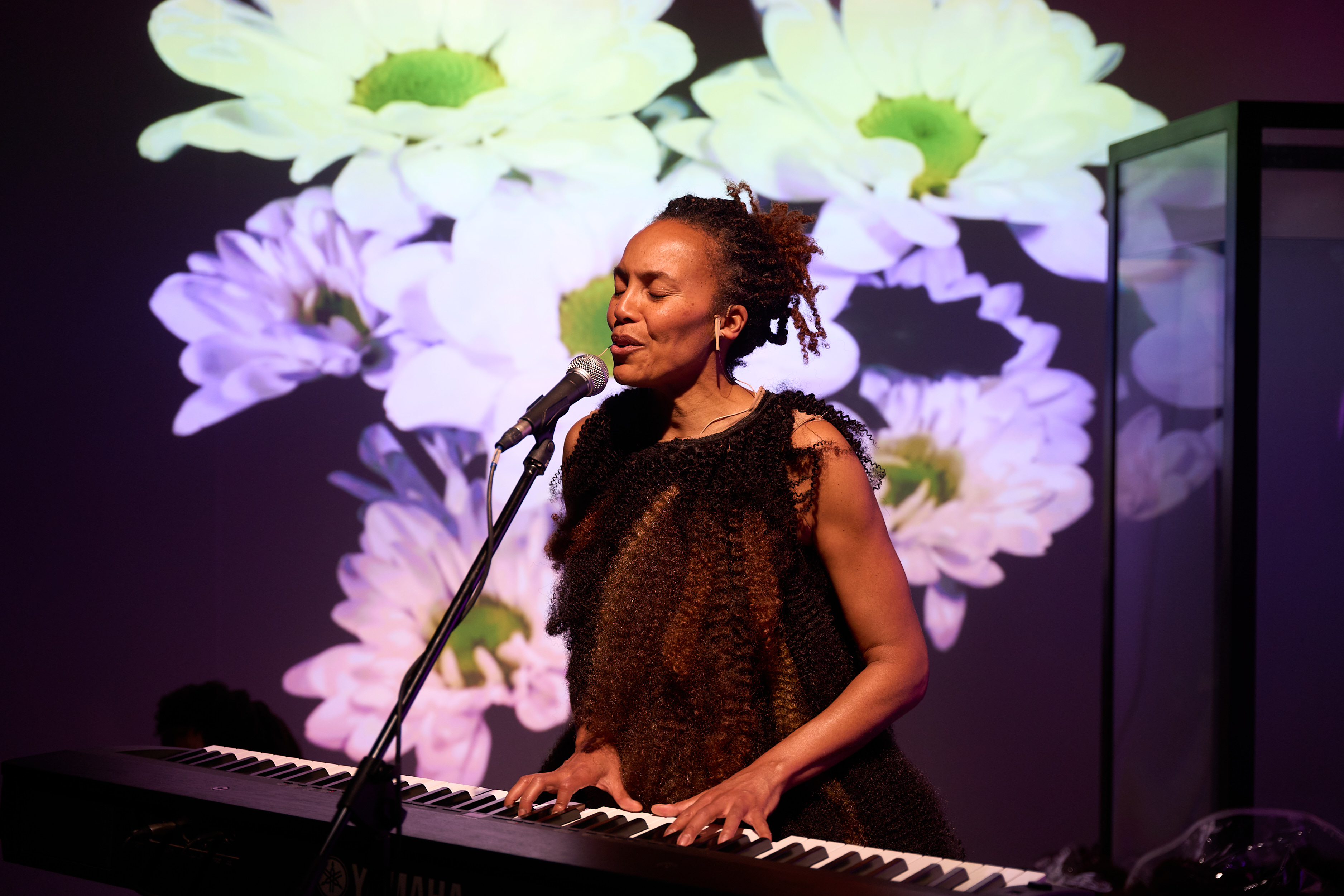
--
Is the Black Body Safe to Perform? Is the Black Body Safe? Is Black Safe?
nicHi douglas
how do we approach a discussion about the safety of the Black body? American history provides countless entry points, whether through the torment of chattel slavery or the modern-day manhunts perpetuated by law enforcement. it should be widely understood that the Black body in America has faced devastating (and consistent) violence since arriving on this land. there is something softer and more nuanced, though, in Eisa Davis’s approach to the question.
in her experimental dramatic work, The Essentialisn’t, Davis suggests that “we aren’t safe, but we are protected” — a position that left me asking if this is the essential nature of Blackness? perhaps, our survival is due not just in large part to our ability to build coalitions of safety with one another, but also due to a kind of spiritual protection afforded to us by our ancestors, God, or The Creator.
though not entirely new, it is a ripe thesis, and one that has stuck with me since engaging with the show. but among the many threads proposed throughout Davis’s work, it was often hard to discern where my focus as a viewer was supposed to lock in. narrative discernment doesn’t seem to be Davis’s ultimate goal. the constant shifting and eclipsing between short monologues, comedic vignettes and movement interludes, supported throughout by a score of poignant and powerful music (also by Davis), makes the topic gloriously elusive, ensuring that we never truly know Davis’s stance — and therefore can’t tell if or when she (or the pair of exceptional chorus members called “SOVEREIGNS” played by Jamella Cross and Princess Jacob) is performing.
The Essentialisn’t is framed as an art exhibit / installation. the written description of the work, posted alongside a sculpture and a participatory writing activation, concisely describes Davis’s background and aim for the evening-length performance. we are told that Davis is “firmly planted in a fertile lineage of avant-garde creators,” and that this “piece makes its own logic.”
the upstage corner of the theater space is furnished with a six foot water tank which Davis submerges herself in as soon as the show begins. as the slippery and quick-changing logic formation of the piece proceeds, i am reminded of the many ways Black folk — and Black femmes especially — need to shapeshift on a daily basis. in my life as an experimental theatermaker, a director & choreographer for hire, and a full-time professor at a predominantly white institution, i perform (see: code-switching) regularly throughout my day — all days in fact, any day that i interact with anyone besides myself.
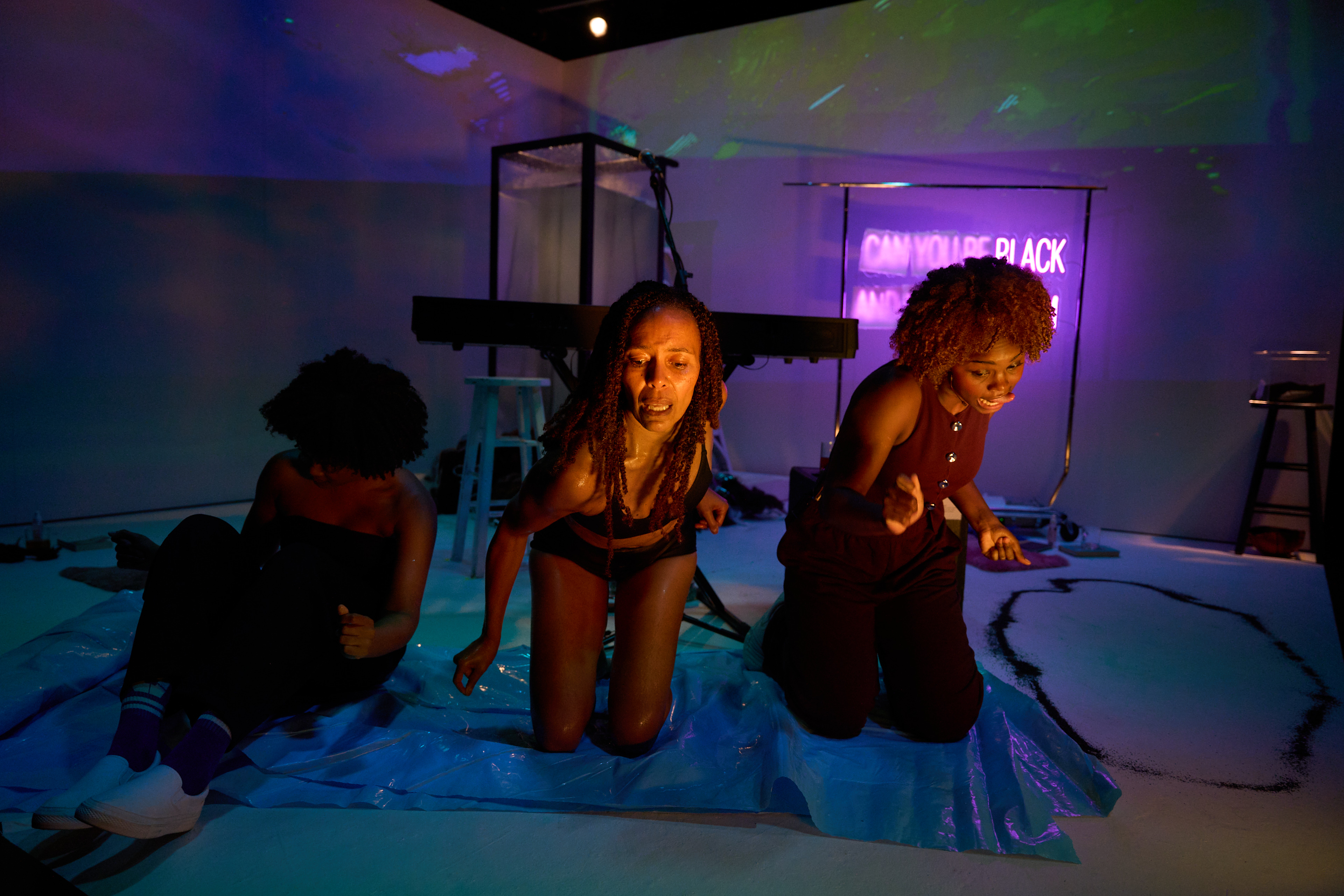
Davis presents and complicates this concept in a hilarious segment about Black women singing, proposing the socially inherited notion that all Black women should be able to sing. in this part of the show, Cross sings a line of music with less and less precision and increasingly off pitch. Davis cheers her on, concluding the segment by announcing that the singing was “disgusting” on the evening that i saw the show. albeit hilarious, this subversive celebration of Black anti-performance demonstrates Davis at her clearest. it is a performance of bad performance as a part of a larger performance that actively questions the nature of the Black body in performance. the satire sparkles in this scene; but even more so, the meta conceit of the work is made defiantly legible. i wonder what would have been “safer” for the SOVEREIGN in that moment? singing impressive runs and riffs to appease audience expectations, or continuing to sink into the abyss of “failure?” the name SOVEREIGN suggests that she would prevail regardless, yet another breadcrumb offered on Davis’s intentionally mystifying pathway.
even as i pen this critique, i find myself performing — in this instance, it’s authorly scholarship. but if i were to write in my own Black vernacular, wouldn’t that be a performance, too? who is my audience? who do they think i am? though rooted in a rebelliously creative tradition exercised by great writers like bell hooks and e.e. cummings, perhaps the all lowercase format of my writing feels like performance. as a Black person living in the United States at this time, i am constantly seeking safe houses for self expression. and The Essentialisn’t reveals to us the many layers of selfhood that a Black individual must reconcile with, all of whom navigate performance in varying degrees. ultimately i choose, as Davis does, to submerge myself in the clear water of my own making, and to cleanse myself of these confounding queries in the safe and quiet bubbling of the tank.
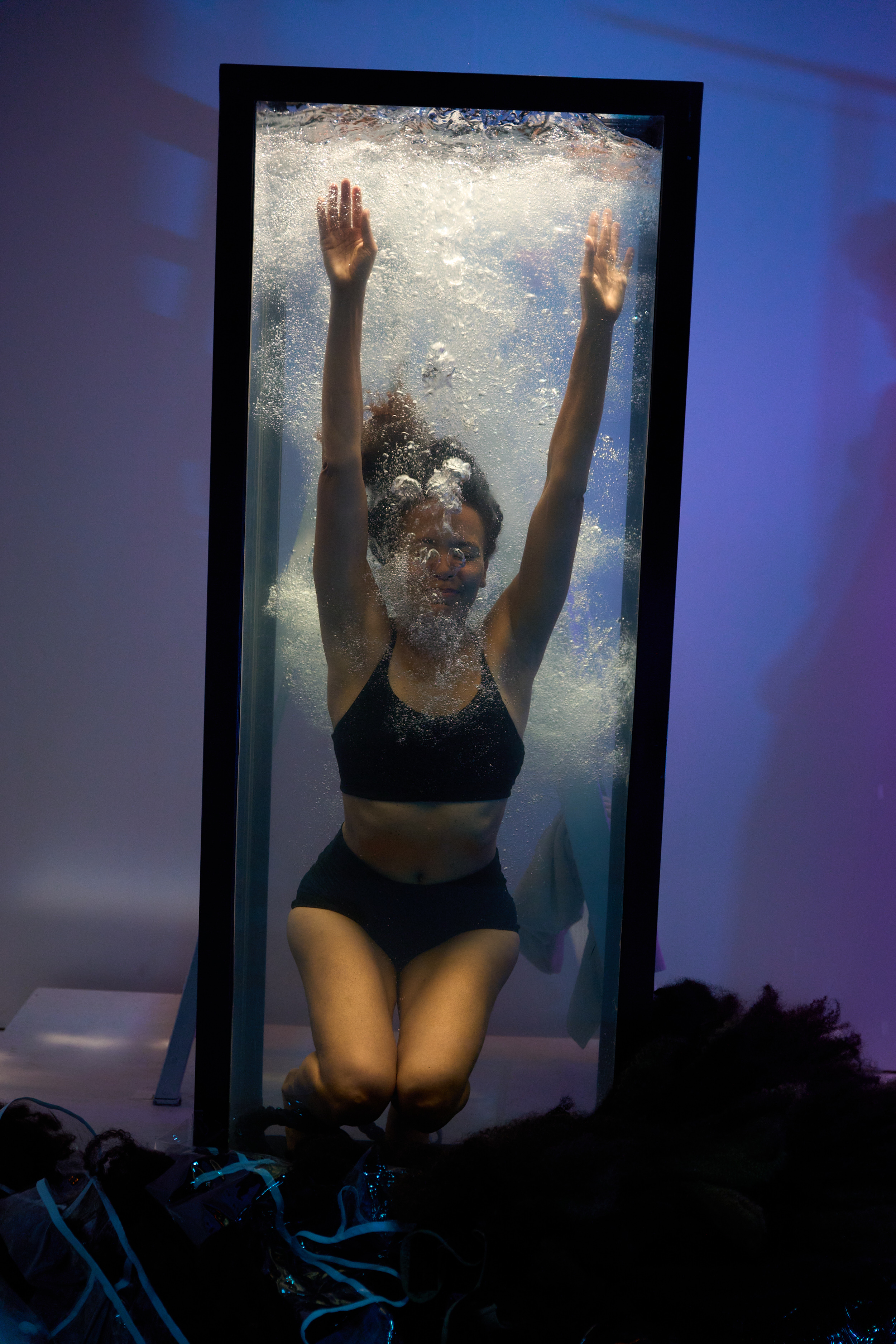
--
Eisa Davis, seeking logic and freedom, looks to the sea
By Soraya Nadia McDonald
“Some of the best pretending in the world is done in front of white folks.”
—Purlie Victorious: A Non-Confederate Romp Through the Cotton Patch, Ossie Davis, 1961
-
“No one knows me
‘Cause I’m magical—not free
I can wear my chains with glee
I got wisdom like no one else
It’s a trick to be
Invisible yet electric company
How many of us
have hidden in plain sight
Like that”
—The Essentialisn’t, Eisa Davis, 2021
-
When Eisa Davis’s The Essentialisn’t debuted in May 2021 at Performance Space New York, it was part of a collection of works by Afrofemononomy, which described itself as a “supergroup of Black Femme theatermakers.” The theatermakers, including Davis, were all responding to the work of the late writer and filmmaker Kathleen Collins, who died from breast cancer in 1988. Collins was 46.
Davis frames the performance with a question: Can you be Black and not perform?
Well, I am Black. Though I’d made myself comfortable in the role of award-winning critic for a website called Andscape (formerly The Undefeated), I missed the Afrofemononomy performances in their entirety. I, then 36, was battling the same beastly illness that killed Collins.
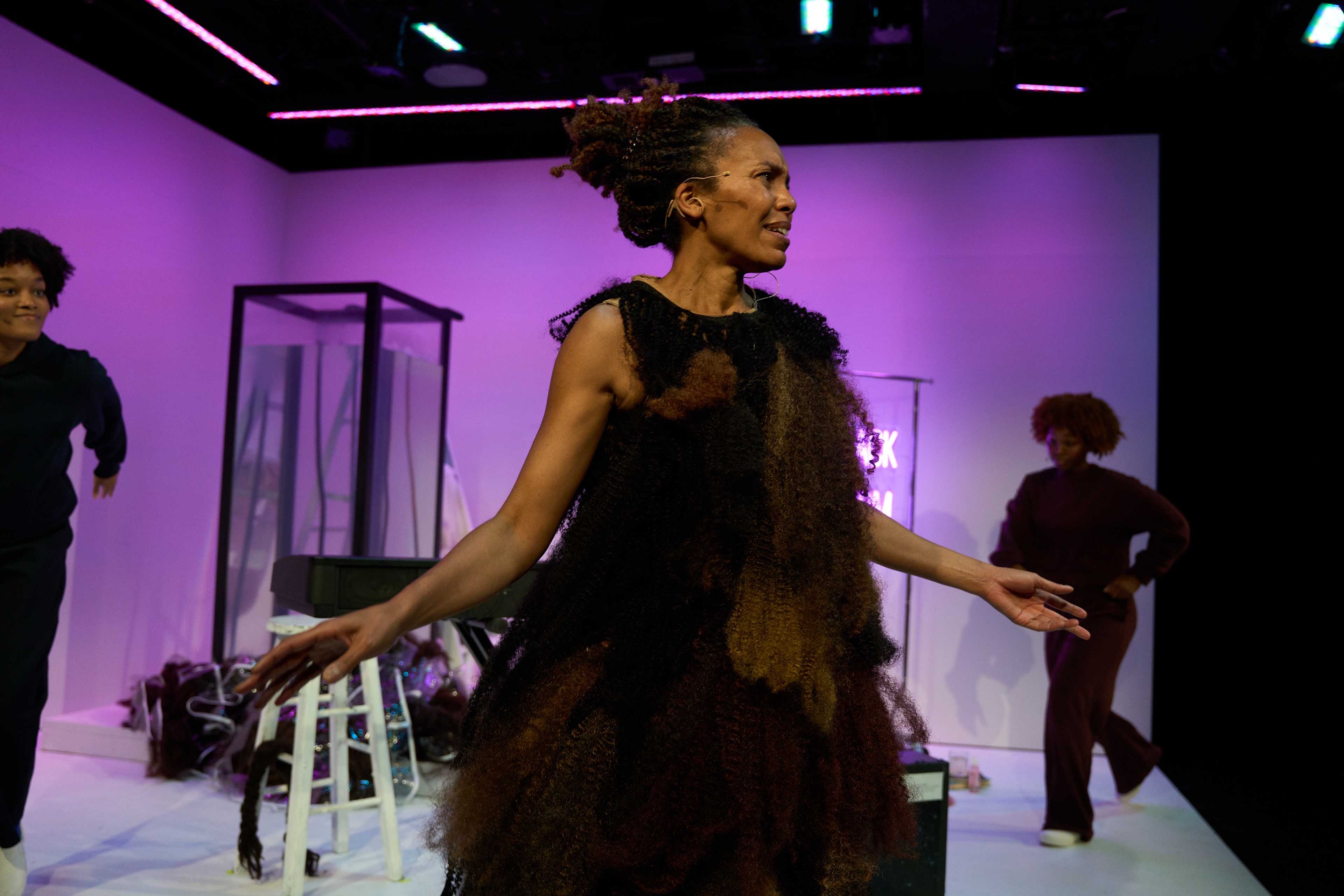
Beguiled, tickled, and touched by the avant-garde dramatic experience of The Essentialisn’t in September 2025 at HERE Arts Center, I turned to the resource I use to both acquire and perform knowledge: the internet. As I read through the critic’s notebook of the 2021 performance, written by Salamishah Tillet, I stopped short.
How could I not have covered this?
Oh. It’s because it happened when I had to stop performing.
When all I could focus on was trying not to die.
Like Kathleen Collins. Oh.
Does writing publicly, as a critic, mean I now have to perform a version of myself whose life and mind wasn’t profoundly altered by surviving breast cancer? What do I do when the shadow of trauma left by that mortal threat finds me in the course of just … doing my job? I’m still figuring it out on a play-by-play basis, but I am glad Davis’s work and this assignment are forcing me to confront it in real time.
“There’s no private, it’s all public, I’m using myself to erase myself,” Davis sings in The Essentialisn’t. Certainly, in the age of social media, we are all writing, re-writing, revising, erasing, and writing more still, some version of ourselves in public. But Black folks were doing that long before the arrival of binary code. Perhaps reinvention is the “Black form” — these words serving as the last configuration of the play’s initial question: Can you be Black and not perform? Throughout the show, Davis employs a fluorescent light sign to guide us through this syntax play as well as the musical meditation she’s having with two other characters onstage she calls Sovereigns, performed by Jamella Cross and Princess Jacob.
The Essentialisn’t welcomes us inside the performance conundrum Davis identifies, to laugh at its absurdity, to revel in the purposeful wrongness of singing off-key, to stroll about, to move for a bit, within the rich interiority that Collins honored in her work. In fact, theatergoers are greeted with a small gallery vignette just outside the stage area. A set of tap shoes, along with books by Fred Moten, Daniel Alexander Jones, Christina Sharpe, Sadiyaa Hartmann, Alexis Pauline Gumbs, and Douglas Kearnly, as well as Davis’s own, hang by black shoestrings from the ceiling, like a mobile. On the floor, a clear ballot box sits next to a Spaulding basketball which has been split in half and filled with black sand and Sharpies. Attendees are encouraged to write down what they believe to be the essence of Black women and cast their vote.
Thinking of the late Ntozake Shange, I wrote down “GOD.”
Reading through the responses during a movement called IF I AM AN OBJECT/BALLOT BOX, Eisa emptied the box and read each response.
“No one wrote down ‘free,’” she lamented.
Perhaps most revealing is that is not improvised, but in the script.
That sent me wondering. What happens if someone writes down ‘free?’ And what does it mean that this work can count so reliably on no one doing so?
For a people born on the water, can an ocean be a womb? Can we find freedom holding fast to a lifeline of truths braided across the Middle Passage? Who knows? Plenty of unscrupulous people get rich performing knowing, but really, who knows?
“We aren’t safe, but we are protected,” proclaim Eisa and the Sovereigns. “Refuge, ritual, rhythm, the ecstatic…that’s our narrative logic.”
That’s a logic this critic can follow. That’s a logic this critic seeks.
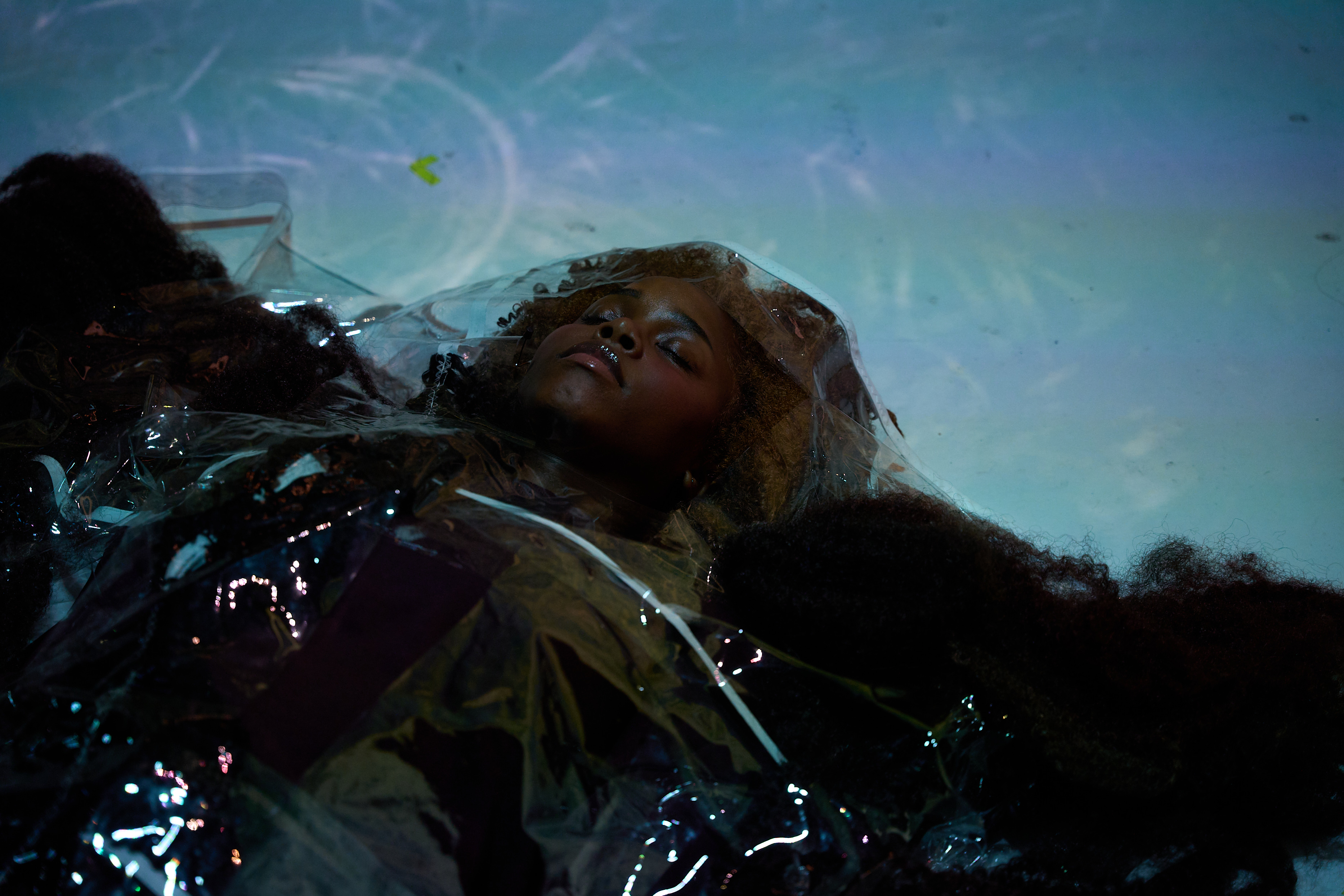
--
The Essentialisn’t is running at HERE Arts Center through September 28th.



